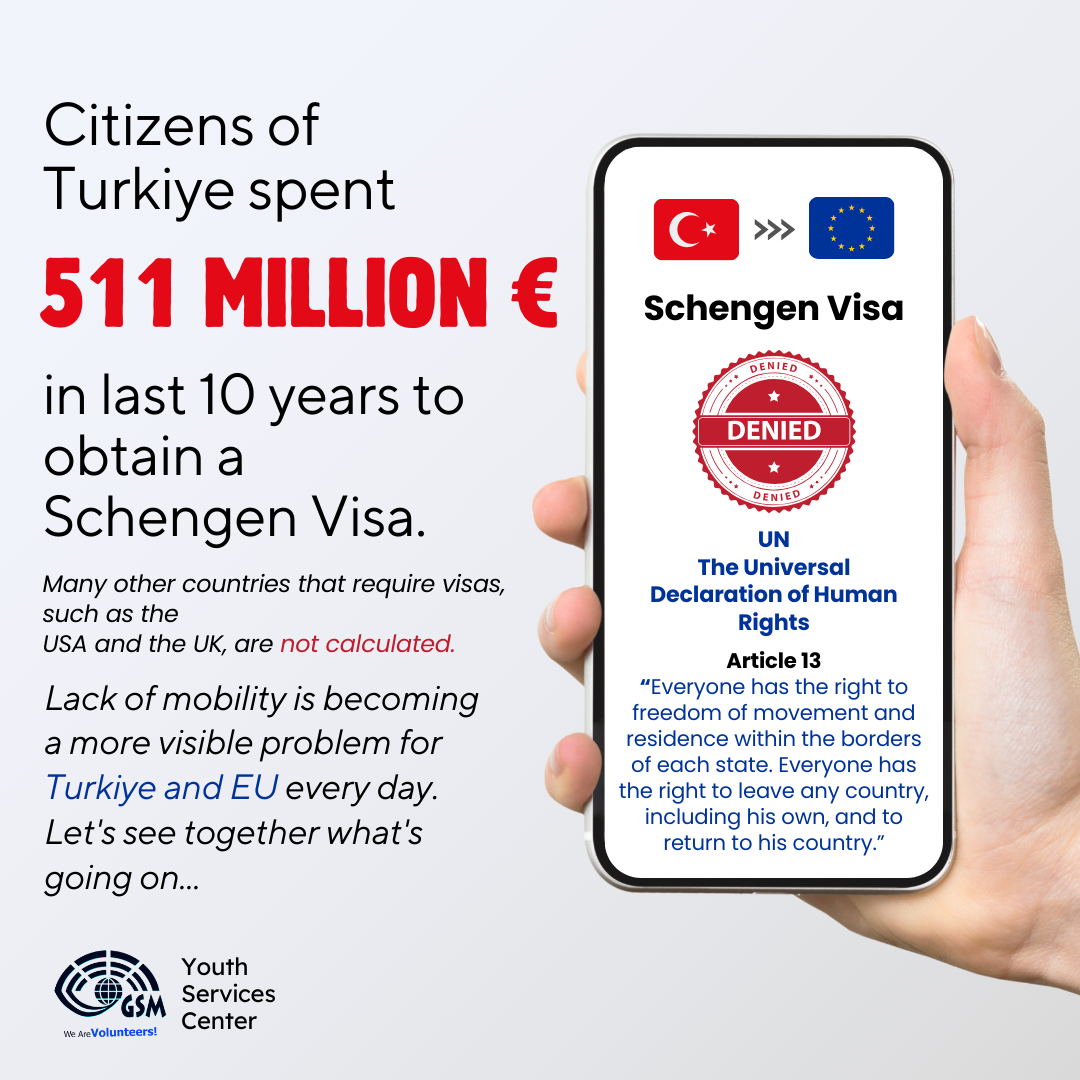


Citizens of Turkiye spent 511 Million € in last 10 years to obtain a Schengen Visa.
Many other countries that require visas, such as the USA and the UK, are not calculated. Lack of mobility is becoming a more visible problem for Turkiye and EU every day. Let's see together what's going on...
Turkiye is a country with very strong cultural, political and economic relations with the EU.
The majority of Schengen Visa applicants from Turkiye are between the ages of 18-35. The young population who are interested in Europe culturally, educationally and economically is quite large and active. EU citizens pay millions of euros in taxes to support the educational, social and cultural needs of the young population in Turkiye. Despite all these strong relations, money and effort spent, it is becoming more difficult for the young population in Turkiye to interact with the EU every day. Its key policies to increase Europe's cultural and political diversity consider exchanges and interaction significant.
So why is there a mobility crisis?
The situation is beyond a problem; it is a fundamental right that we must defend, whether we are the subject of it or not.
Citizens of Turkiye have to use companies assigned by embassies to apply for visas. In order to make an appointment with these companies, they have to act 3-5 months in advance. These intermediary companies have a very insufficient service capacity. For this reason, they declare that they cannot serve everyone as they did before the pandemic. It is actually the responsibility of embassies to ensure sufficient service capacity. Because these limits are determined by the embassies itself. Many applicants have to cancel their trip because they cannot find an appointment. Most of the time, the flight ticket they bought is also lost. Those who cannot find a free appointment but whose travel is necessary often obtain visas from other countries and join the Schengen Area legally but indirectly. This means much more money, time and energy is spent. This way is not equal and environmental as well.
Finding appointment to apply for a visa: Beginning of further problems.
For most of the countries, applicants cannot choose their visa appointment themselves. They must be present and submit their application on the day and time determined by the visa company. The personal information of applicants protected by the GDPR is requested along with a petition in a foreign language clearly stating their intention. Their marriage status, home address, bank account activity and balance information, documented permission from their organization or school, signature circulars, social security information, their family tree, place of birth, any visas they have previously received; if any, passport copy of the person who invited the applicant. The flight tickets and accommodation must already be booked as well. Information and documents that have nothing to do with security, directly question the person's private and personal life, and disclose the economic status are requested. Information and documents are requested that unemployed young people cannot answer.
A delicate calculation: Is it all worth it?
The applicants waiting for a result an average of 20 days for each application. Despite all this effort, 20.7% of the applications were rejected. (By the way, the rejection rate of Russia is %19.7) The most common reason for rejection being "not believing that the applicant will return to the country" and "economic insufficiency". Even if the application is accepted, applicants ask whether all this was worth it for a -let’s say- one week trip. Because they also have to buy Europe's most expensive flight tickets and, due to the exchange rate, they have to spend many times more than citizens of every European country. Even the travel expenses reimbursed to young people by funds such as Erasmus+ and ESC are far below the expenses made by young people in Turkiye. It is obvious that these repayment funds are not balanced and fair as well. How can we claim that a person who already made a proper travel plan and bought a return ticket may not return to her/his/their country?
Kicking the can down the road: Objection and solutions
An applicant whose application is rejected receives a document from the embassy explaining why the application was rejected and the way to appeal is also explained in this document. This is where things get a little complicated. For many countries, the only way to appeal is to hire a lawyer from the country that rejected the application and to sue the consulate. It is not enough for the lawyer to be a citizen of that country. A rather expensive and practically impossible way of appeal. Some countries have kept the objection route simple. The applicant submit an objection petition to the consulate and that's it. As you can imagine, no matter how easy or difficult the appeal route is, most applicants refuse to appeal. Because at this point the applicant feels humiliated and unwanted. Because consulates do not give the applicant the opportunity to prove themselves by presenting additional documents and new evidence. Instead, they choose a path that is easy for them, but traumatic for the applicant. Rejection. At this point, all the expense and effort is wasted.
Even a problem should be equal to everyone: Something about who your parents are?
There are two types of passports commonly used in Turkiye. Red and Green. Red passport is the ordinary passport used by the majority. Green passports can be used by government officials and their children. This passport allows visa-free travel to the Schengen area. If by chance you were born as the child of a government official, EU welcomes you for 89 days. At this point, it is necessary to remember what was said in the Council of Europe about equality of opportunity. The fact that traveling to Europe is becoming more expensive day by day, of course, also divides the problem economically. Young people below a certain income level do not even apply for a visa. Among those whose visa applications are rejected, there are famous artists, Turkish representatives of umbrella structures in the EU, professionals who have been working in the field of civil society for many years and have already received Schengen visas many times, business people, students, volunteers, youth workers etc. Does freedom of travel choose people?
A youth that can give lifeblood to European cultural and political diversity:
Young people living in Turkiye are already very diverse culturally and politically. They come from different origins, lifestyles and cultures and live in the same neighborhood. For this reason, they have very different perspectives and visions in every sense. A new and different generation is growing up that can protect themselves from standardization. Living conditions in Turkiye push young people to be politically active. This makes them active citizens at different levels. The youth of the country with the highest voting rate in Europe are constantly on the move in terms of proactivity. Breaking the hearts of such a youth population and causing them to turn their backs on Europe will push them into the arms of other parties. Instead of doing this, it is the duty of all authorities to grant them the freedom of travel they deserve as a rational policy. We can say that isolating young people in Turkiye from Europe does not benefit anyone.
The solution is right under our noses: If we want to do...
There is no need to go far for a solution. Visa requirements for all travel from Turkiye to Schengen area should be abolished for the short term (89 days). Including Turkiye in the Schengen area could also be a solution. Making this decision may take a long time bureaucratically. This is understandable. Until then, embassies must do what is necessary for visa companies to keep up with the increasing number of applications. However, investigations and softening efforts are necessary regarding visa refusal. The budget allocated for travel expenses to Turkiye from funds such as Erasmus+ and ESC should be increased. Space should be made available in existing areas so that young people in Turkiye can come into contact with cultural, political, economic and educational life. Such as national youth councils.
Thank you for reading!
This was only a beginning of a wave. We will be improving the ideas and involving more young people into this advocacy!
Please keep your eyes on us.
GSM - Gençlik Servisleri Merkezi (Youth Services Center)
1985, Ankara
Member of the Alliance
Member of the CCIVS
Member of the GoFor (National Youth Council, Turkiye)
Partner of the SCI
Council of Europe - GEW Coordinator, Turkiye